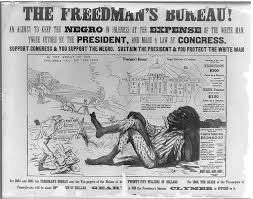This Day In History: March 3rd
The Reconstruction Era left America to deal with the aftermath of the Civil War and during this time the nation struggled with how to transition the formerly enslaved population. To address this need, Congress established The Freedmen’s Bureau on March 3, 1865.
The bureau was intended to be a temporary agency during the war and withstand a year afterward. It was established two months before Confederate General Robert E. Lee surrendered to Ulysses S. Grant and ended the Civil War. Former rebel states were organized into districts and each district was lead by an assistant commissioner. The bureau was understaffed (less than 1000 agents during its peak) and often underfunded.
Freedmen’s Bureau was controlled by the War Department and many original employees were Civil War soldiers. Oliver Otis Howard was a Union General who was appointed commissioner of the bureau in May of 1865. As one of its founders and the head of the Freedmen’s Bureau, Howard became the name-sake of Howard University which was established in 1867 and served as the university’s president from 1869 to 1874. Other colleges that come out of the establishment of the bureau include Fisk University and Hampton University.
In addition to creating colleges, the bureau sought to help the formerly enslaved population and poor whites in the South by offering food, housing and medical aid, and legal assistance. Although the bureau provided opportunities to the disenfranchised, it faced much resistance from white Southerners and even President Andrew Johnson.
Congress introduced a bill in February of 1866 to give the bureau legal power, but Johnson vetoed the legislation. Congress overrode the president’s veto and passed a revised version of the bill, but disagreements over what type of assistance the government should provide began to arise.
Less than a decade after its establishment, the bureau was dismantled by Congress in the summer of 1872. A variety of issues, including inadequate funding and pressure from southerners led to the demise of the agency. Its mission to lead a path of upward mobility brought attention to the need for government involvement in issues of social welfare and aided millions of African-Americans.
Originally posted 2021-03-03 10:30:00.








